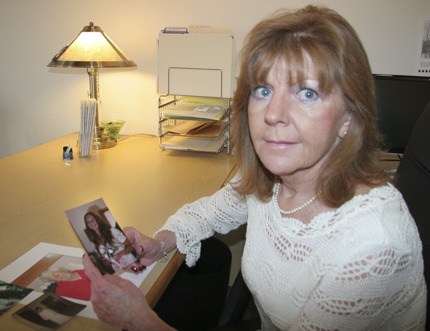The color blue represents hope in the fight against colon cancer. Fall City’s Farmhouse Market store was decked out in that color on Friday, March 5, as Fall City residents observed Colon Cancer Awareness month.
Market owner Melissa Bluer was helping support her cousin, Anita Mitchell, a West Seattle resident and colon cancer survivor. Four years ago, Mitchell founded the Dress in Blue Day, a colon cancer awareness event that has caught on nationally.
By turning Fall City Market blue, “I figured I could inform 90 percent of the people,” Mitchell said.
Mitchell passed out cards with facts on colon cancer, the third-most commonly diagnosed cancer and the second leading cause of cancer death for both men and women in the U.S.
“In my case I was only 40 years old when I was diagnosed,” Mitchell said. “I had symptoms, had a family history, and thought my dad had died of bone cancer when I was 16. But it was actually colon cancer.”
Early prevention
Ninety percent preventable when detected early, colorectal cancer can be caught by screening and removal of polyps before they become cancerous.
Going door to door on the main drag of Fall City, Mitchell met a man who told her, ‘Finally, awareness of a disease for men.”
She replied that colon cancer effects men and women equally.
Nine out of 10 cases affect people 50 or older, but colorectal cancer can happen to any gender at any age.
Fall City resident Christine Johnson decided to get a colonoscopy six years ago, after her sister, Cheryl, died from colon cancer at the age of 43.
A year ago her father, Jim, was diagnosed with colon cancer.
“It wasn’t too long after that that I started going to screenings,” she said. “If you have the history in your family, they want you to get in and immediately do it.”
Talking with Mitchell, Johnson help spread the word to the community and passed out the informational cards.
“I’m interested in helping to raise awareness. People are just embarrassed about it, (but) it’s so stupid,” Johnson said. “Breast cancer is all over the place. But colon cancer is one of the most curable cancers there is.”
Seen as an uncomfortable and painful procedure, Johnson said people need to understand that screenings are simple, pain-free tests that can save your life.
The American Cancer Society estimates that about 146,970 new cases and 49,920 deaths were expected last year. About 72 percent of cases arise in the colon and about 28 percent in the rectum.
Very passionate on the awareness of colon cancer, Johnson said she will do anything she can to help save anybody else.
She has learned from her mistakes and wants to be an advocate to help other people feel comfortable and aware of the disease.
“Mine was a total preventable case,” Mitchell said. “I didn’t have to get this.”
For more information, visit www.ccalliance.org.



